I asked Bing to plan my vacation – and I might as well just stay home
Bing AI, the World's Most Beleaguered Travel Agent

Sign up for breaking news, reviews, opinion, top tech deals, and more.
You are now subscribed
Your newsletter sign-up was successful
When Microsoft unveiled Bing AI to the world, it made some lofty claims about how it could help with our everyday search needs. Among Bing’s newly-acquired abilities that Microsoft highlighted during the launch was being able to help jetsetters plan out entire vacations.
Naturally, the ex-travel writer and perpetual nomad in me was skeptical. How could an AI chatbot plan a well-thought-out travel itinerary, and make worthwhile recommendations, when it’s never experienced any of these destinations or attractions? (Or at least, not yet. This isn’t Ex Machina.)
After all, it’s really only taking snippets from various source articles that were either written by copywriters with minimal experience themselves, or travel writers who’ve been shuffled around from one tourist trap to another by sponsor resorts and tourism boards. And it’s regurgitating all that content, much of which is dubious, without proper context.
Still, ever the curious Capricorn, I had to see for myself. So I took my sudden urge to buy a plane ticket to Greece as the perfect opportunity to see just how capable Bing was of planning my trip.
Can we all now just rely on Bing AI to plan our trips? Should travel agents and travel writers start worrying about their jobs? Well, at this point, let's just say you don't need to be worried about Bing…
Like a travel agent who’s been in the biz too long
Chatting with Bing AI about planning my upcoming 15-day Hellenistic adventure felt like I was sitting in a tiny, dingy travel agency, the interior of which hasn’t been updated since the 1980s, in front of an aging travel agent who’s gotten tired of planning other people’s vacations and probably just wants to get on a cruise ship and enjoy wild, drunken nights with other tired, dejected souls.
Brutal, I know. But Bing AI not only took its sweet time responding to my simple questions, as if it was billing me by the minute, but its answers were the chatbot equivalent of “Let me print out this list for you on my dot matrix printer so you know which things you should see when you get there.”
Sign up for breaking news, reviews, opinion, top tech deals, and more.
“Can you help me plan my 15-day Greece vacation this April?” I asked. “Sure, here’s a list of six destinations in Greece you should see. I even included in parentheses how many days you should spend in each. Aren’t I great?” Bing AI responded.
“How do I get around without a car?”
“Here’s a short paragraph about the different ways to get around, with links to every sentence. You should do research in your own time, as this is a waste of mine.”
“What should my budget be without airfare?”
“It varies, but since you’re poor, here are tips to save money.”
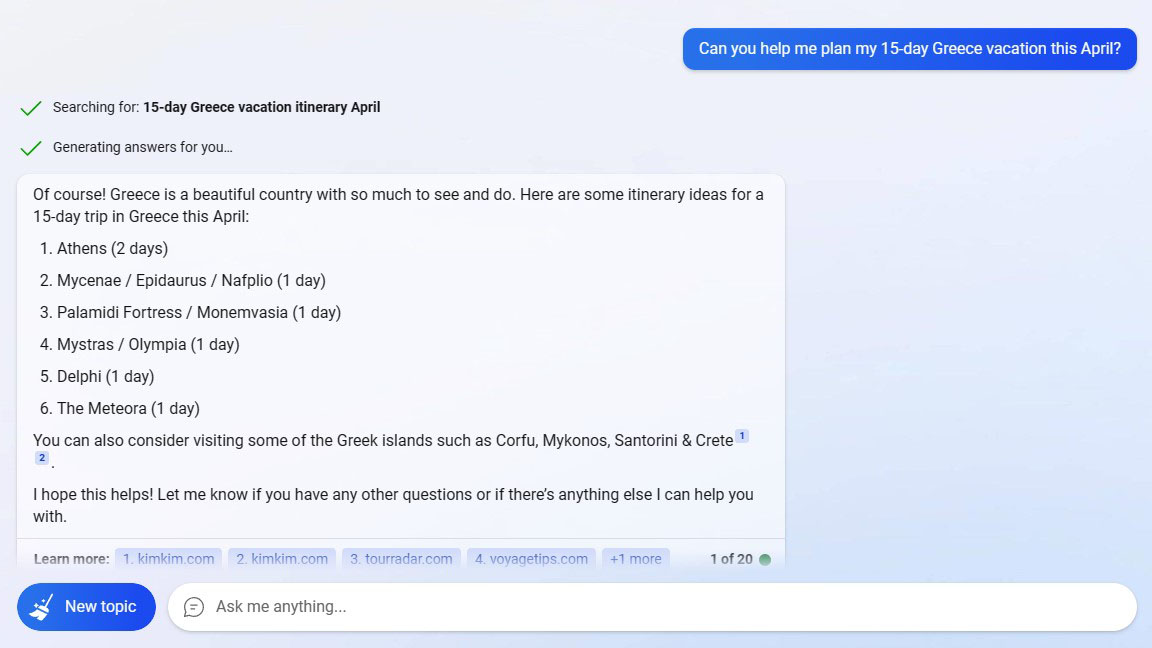
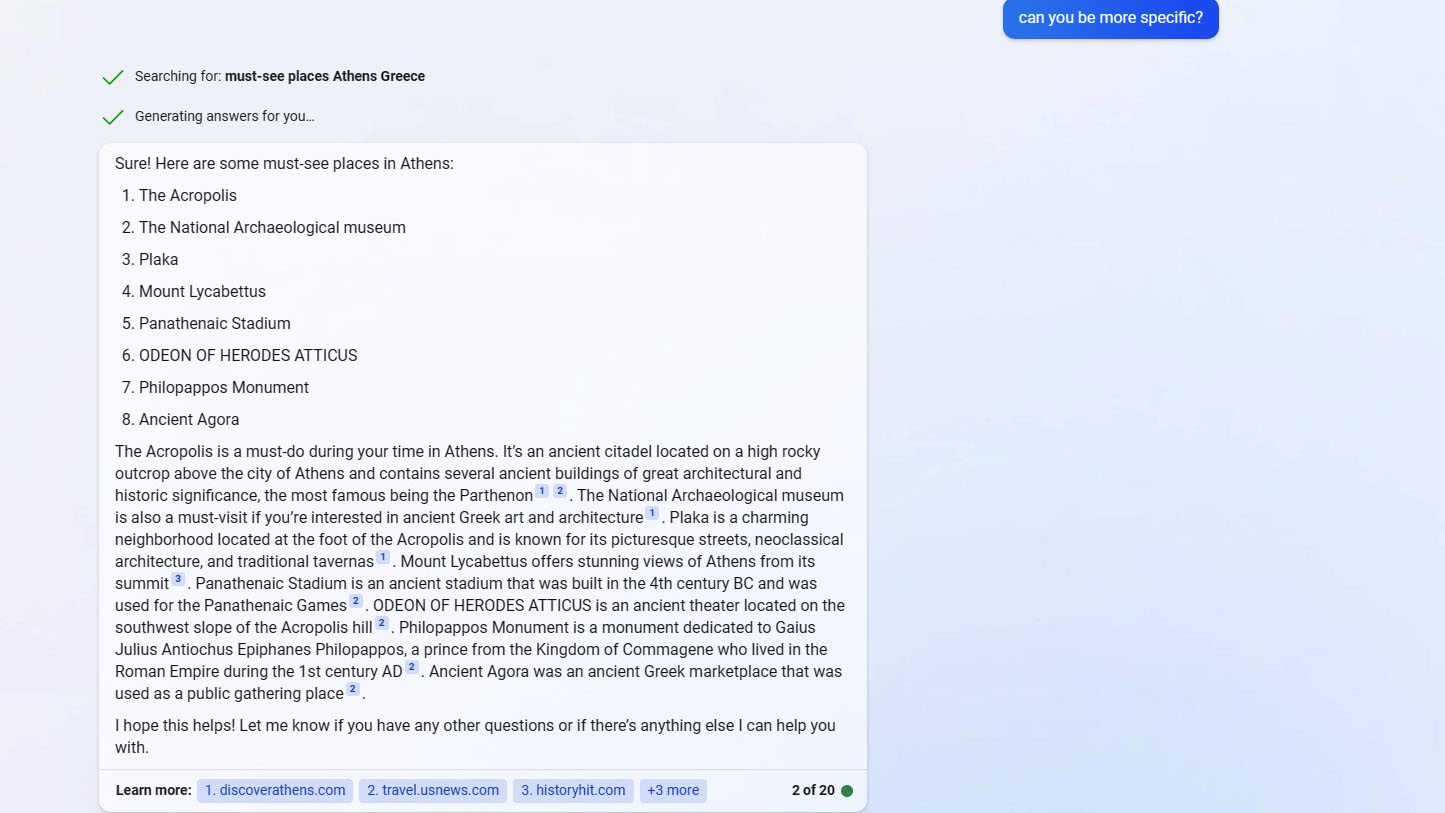
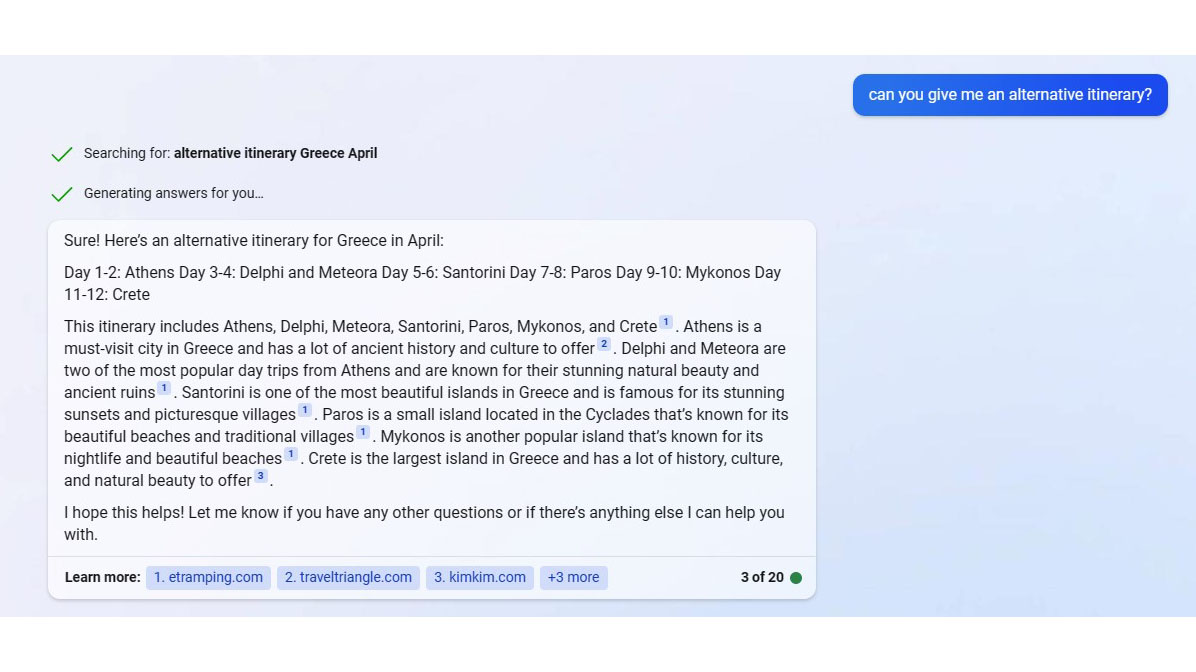
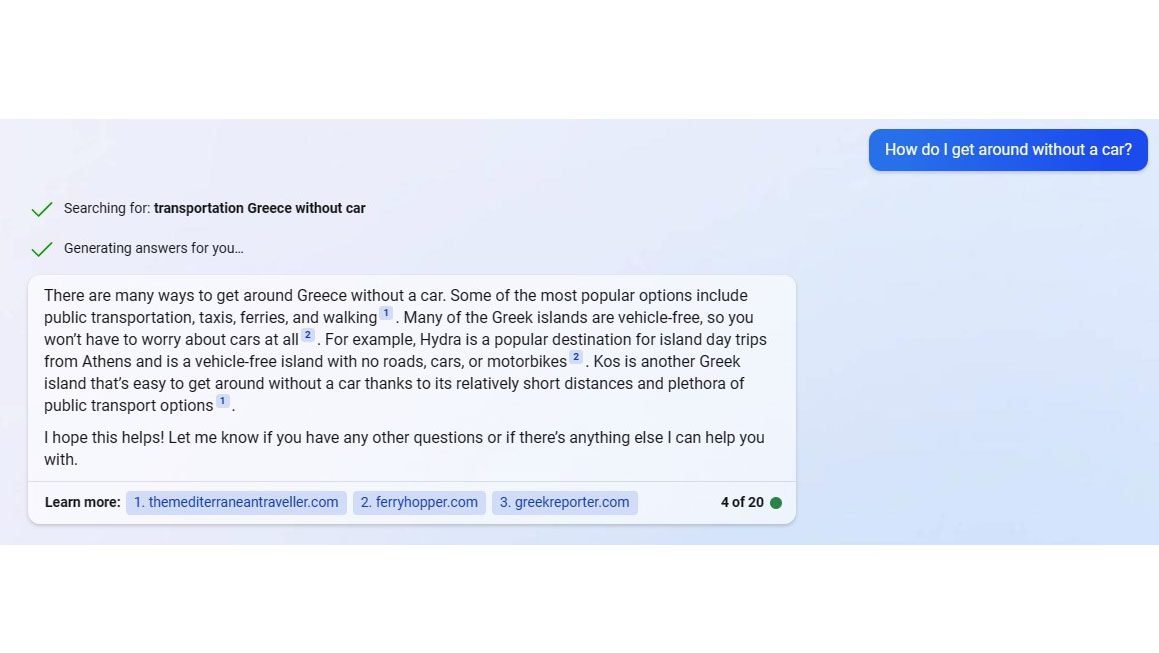
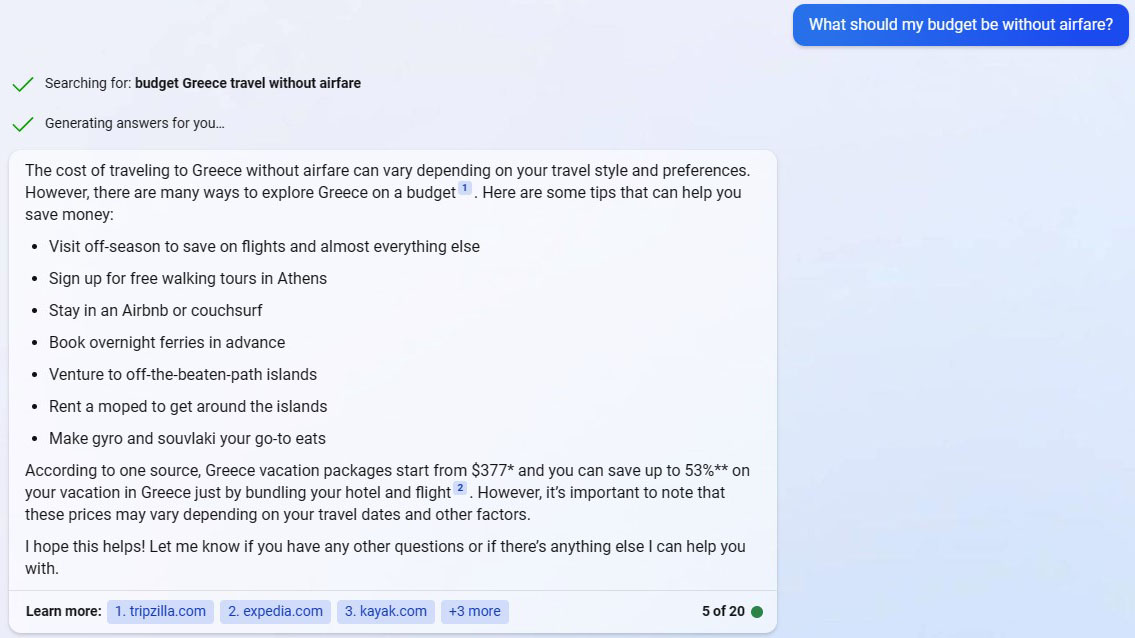
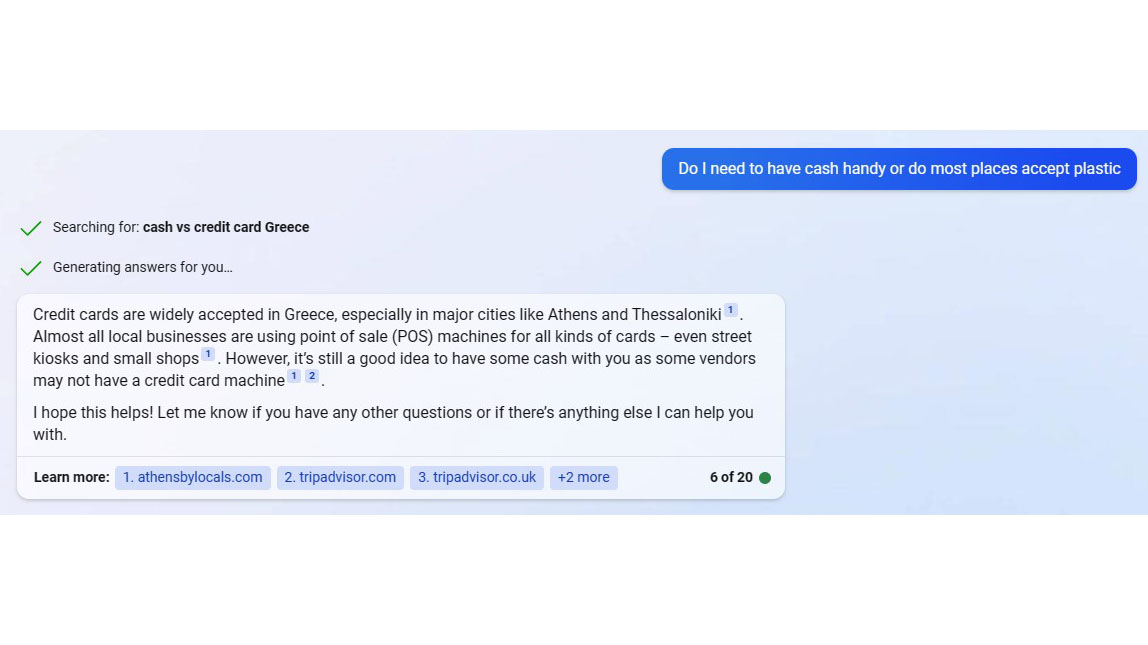
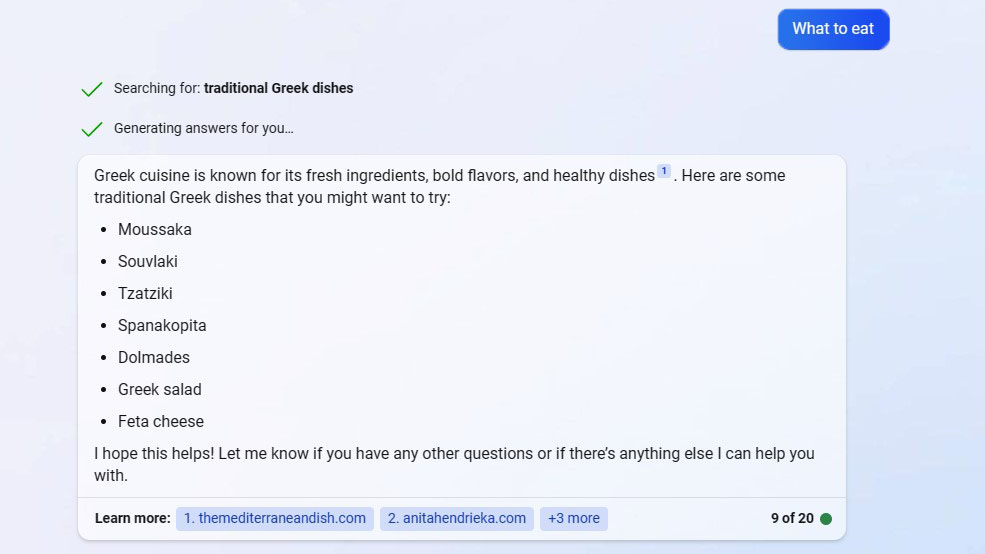
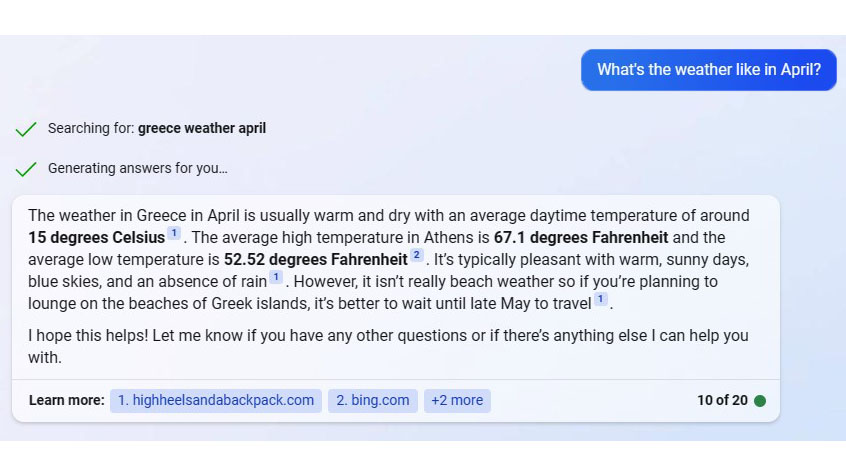
Yes, yes, I’m exaggerating, and you can see the screenshots of my interactions with Bing above for context. But, that was what the whole interaction felt like… as if I was talking to someone who didn’t really care, or just didn’t think I’m worth spending time and effort on, which isn’t what you want from an actual travel agent who’s promised to help you plan your trip.
When I asked for a detailed breakdown of its 15-day itinerary suggestion, if you can call it that, Bing just gave me a second list, with an accompanying paragraph made up of one-sentence attraction descriptions, linked out to different sources. When I asked about common tourist scams, it just gave me a short list of them without explanation, as if it expected me to already know exactly what the "buying a drink for the girl at the bar scam" is. When I asked for food suggestions, it gave me yet another list, and a link to a page of Greek recipes.
Perhaps the worst part of this whole interaction was that I couldn’t even take a copy of those lists home. Unlike ChatGPT, Bing Chat doesn’t save your chat history, so when I accidentally clicked on a link that opened in the same tab, I lost the whole thread (thank god for the Snipping Tool). Apparently, there’s an extension you can download and install to give you that ability to save chat conversations, but that’s like paying another hidden fee for something that should already be part of the service.
ChatGPT wants you to have the best time
I know what you’re going to say next: What did you expect? It’s an AI chatbot, so of course its responses aren't going to be as nuanced as a human's, and it has its limitations. But I put those same exact questions to ChatGPT rather than the ChatGPT alternative – and the experience was the complete opposite.
Enlisting ChatGPT as my de facto travel agent was, in fact, massively helpful. Remember, I'd bought my plane tickets on a whim, I’ve made zero plans, and I’m leaving in a couple of weeks. I also have not been to Greece before, and most of what I know about it is from Edith Hamilton’s Mythology, Homer’s The Iliad and The Odyssey, and The Sisterhood of the Traveling Pants. In other words, nothing. So, I’ve been kind of nervous about going.
Luckily, when I posed those same questions about traveling to Greece, ChatGPT went to work. Not only was it quick to respond, but its answer to my “Can you help me plan my 15-day Greece vacation this April?” question was a long, very detailed suggested itinerary that essentially covered all 15 days, with specific suggestions in every destination. It even gave me a detailed breakdown when asked, separated by days and with the occasional mention of what time of day I should travel from one place to another, and which station I should go to to catch my bus.
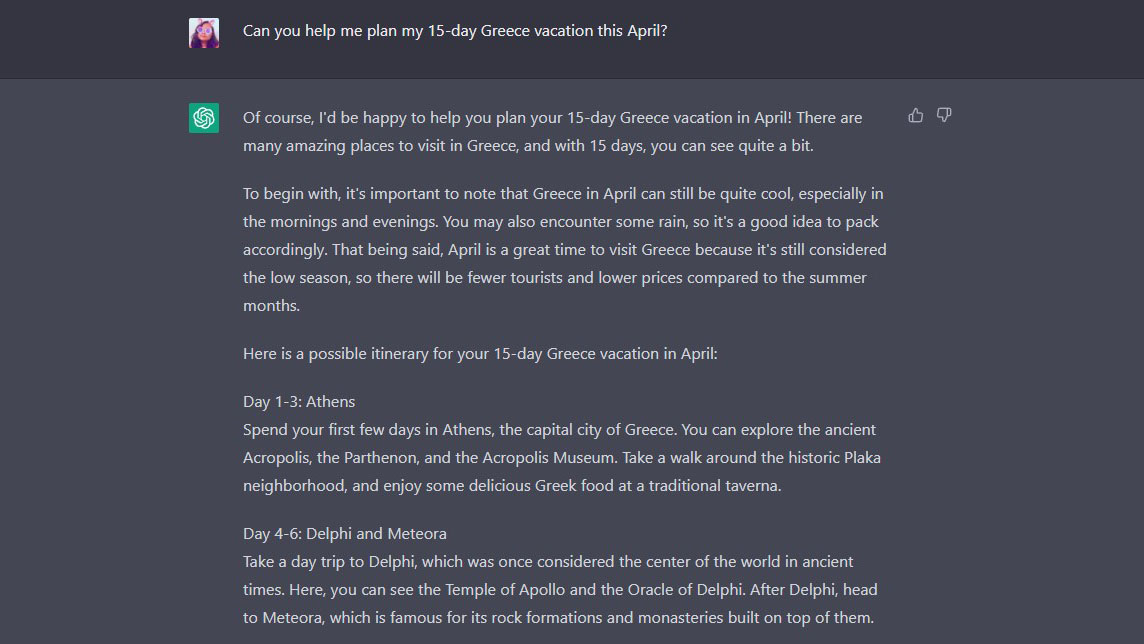
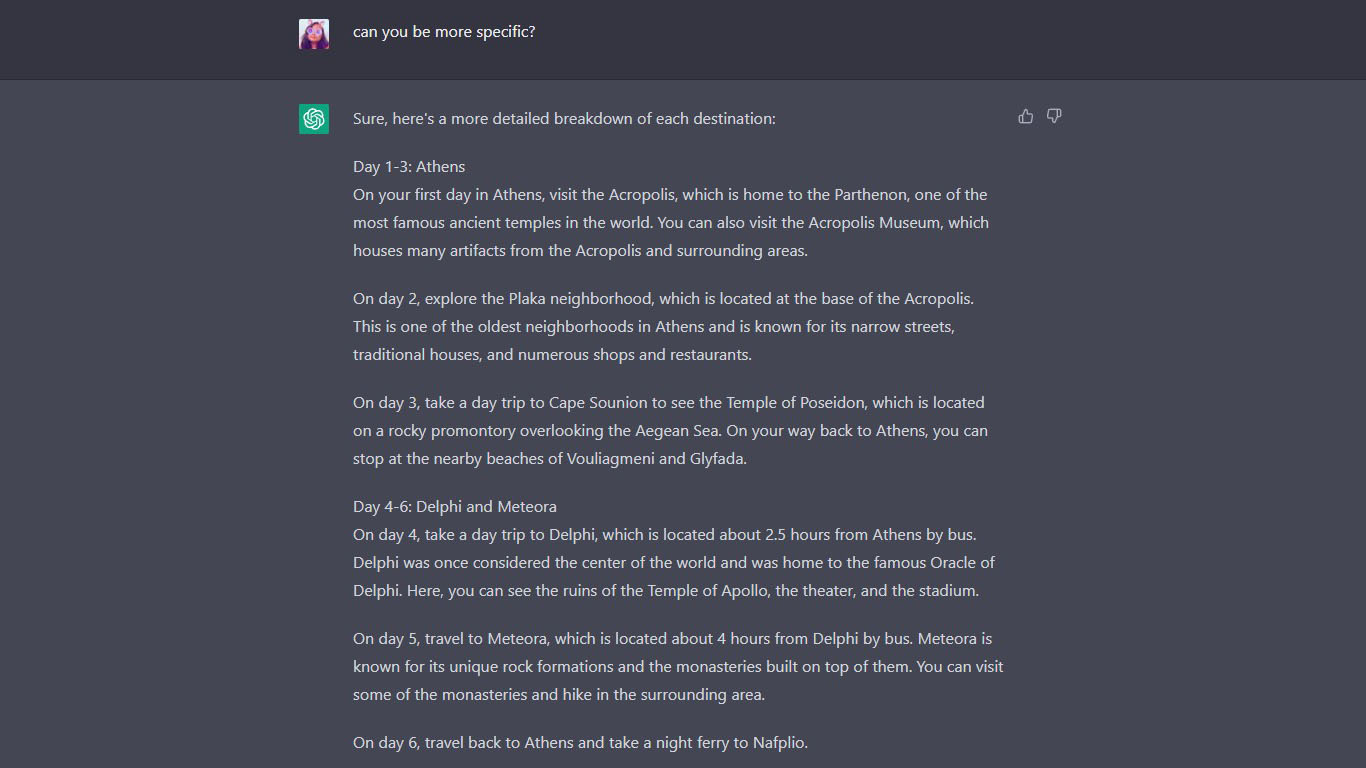
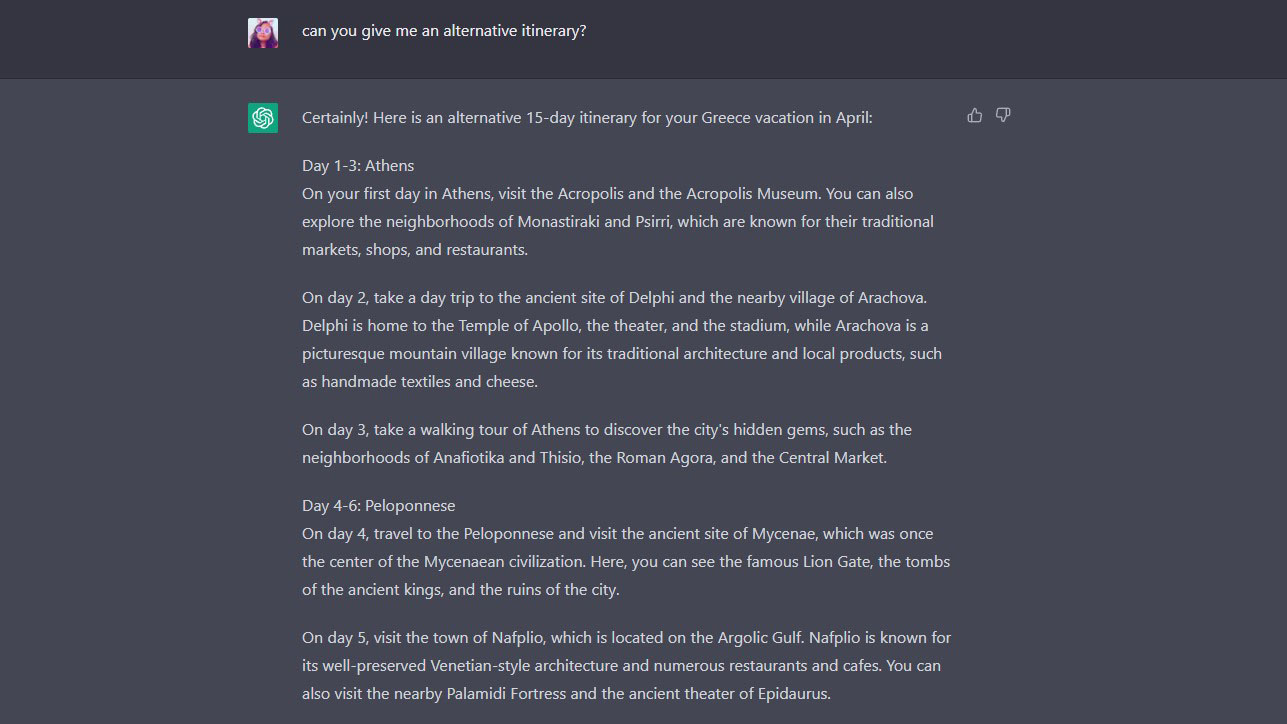
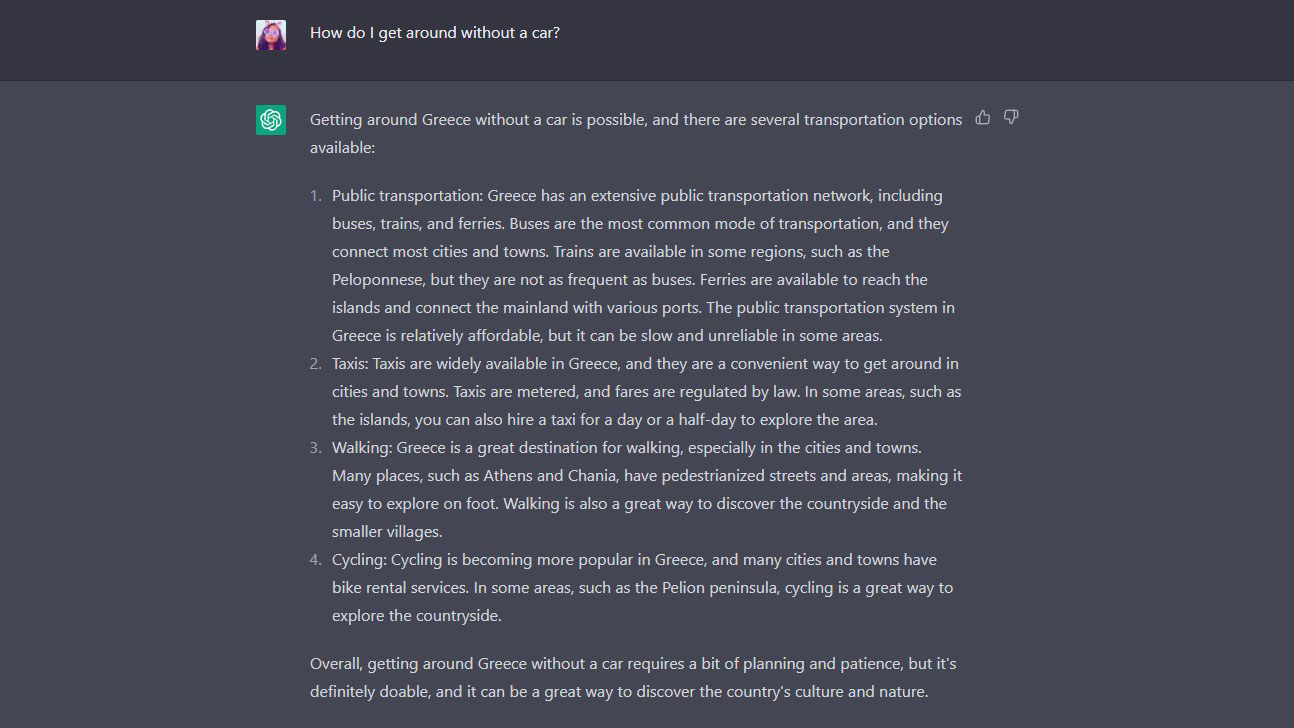
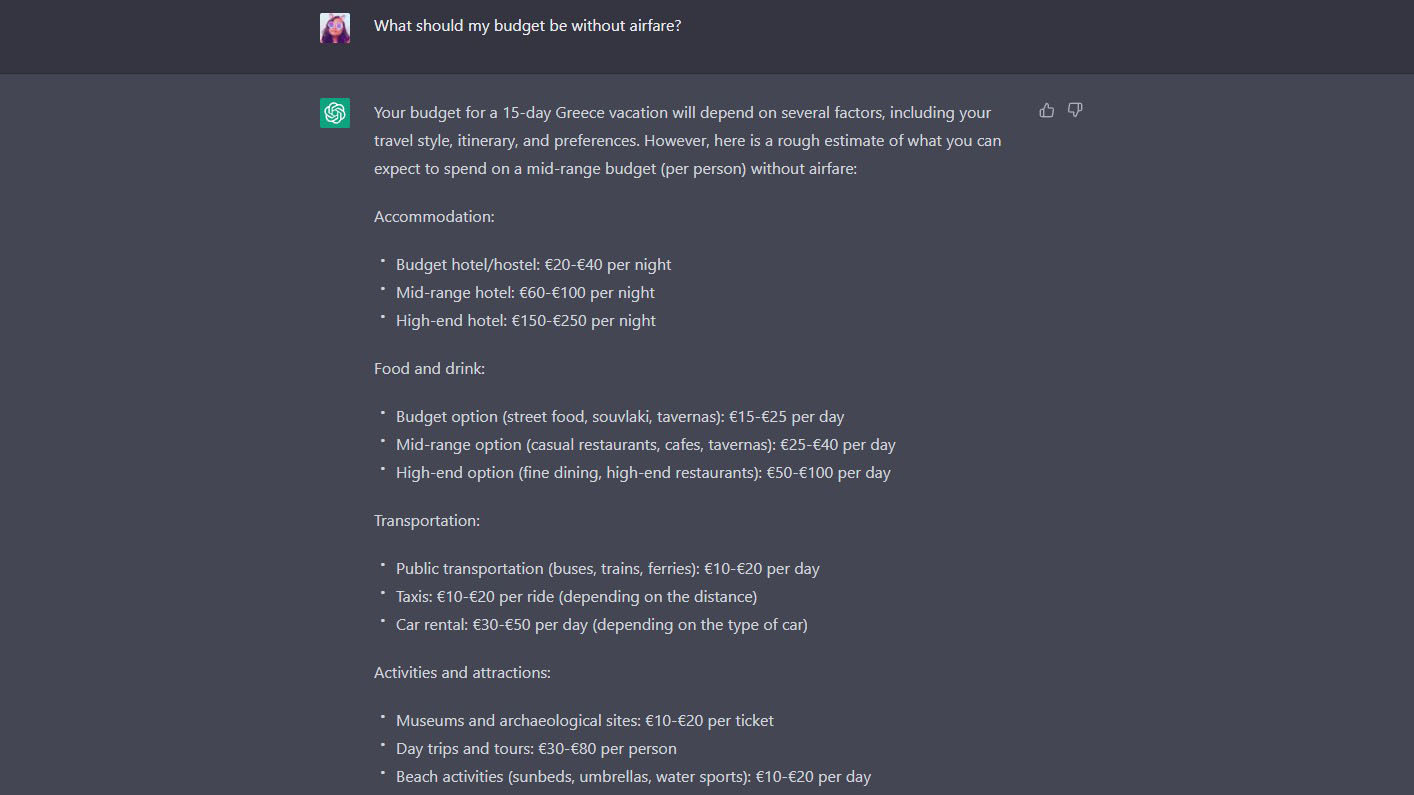
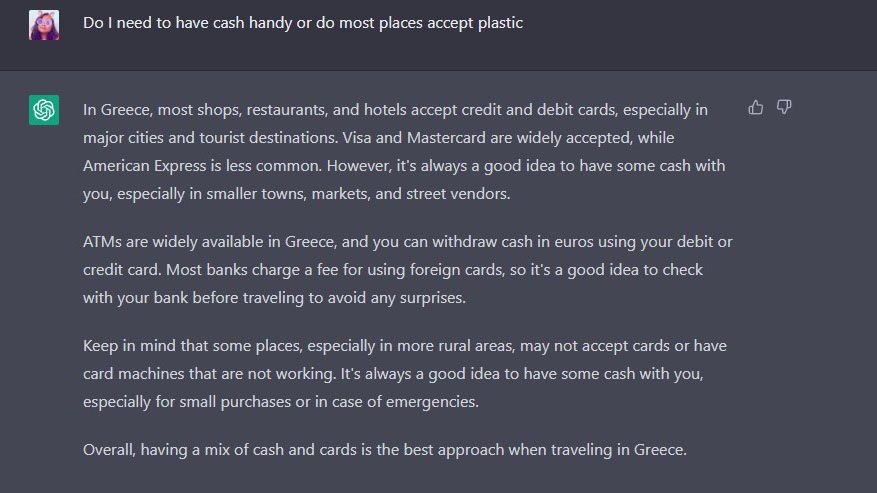
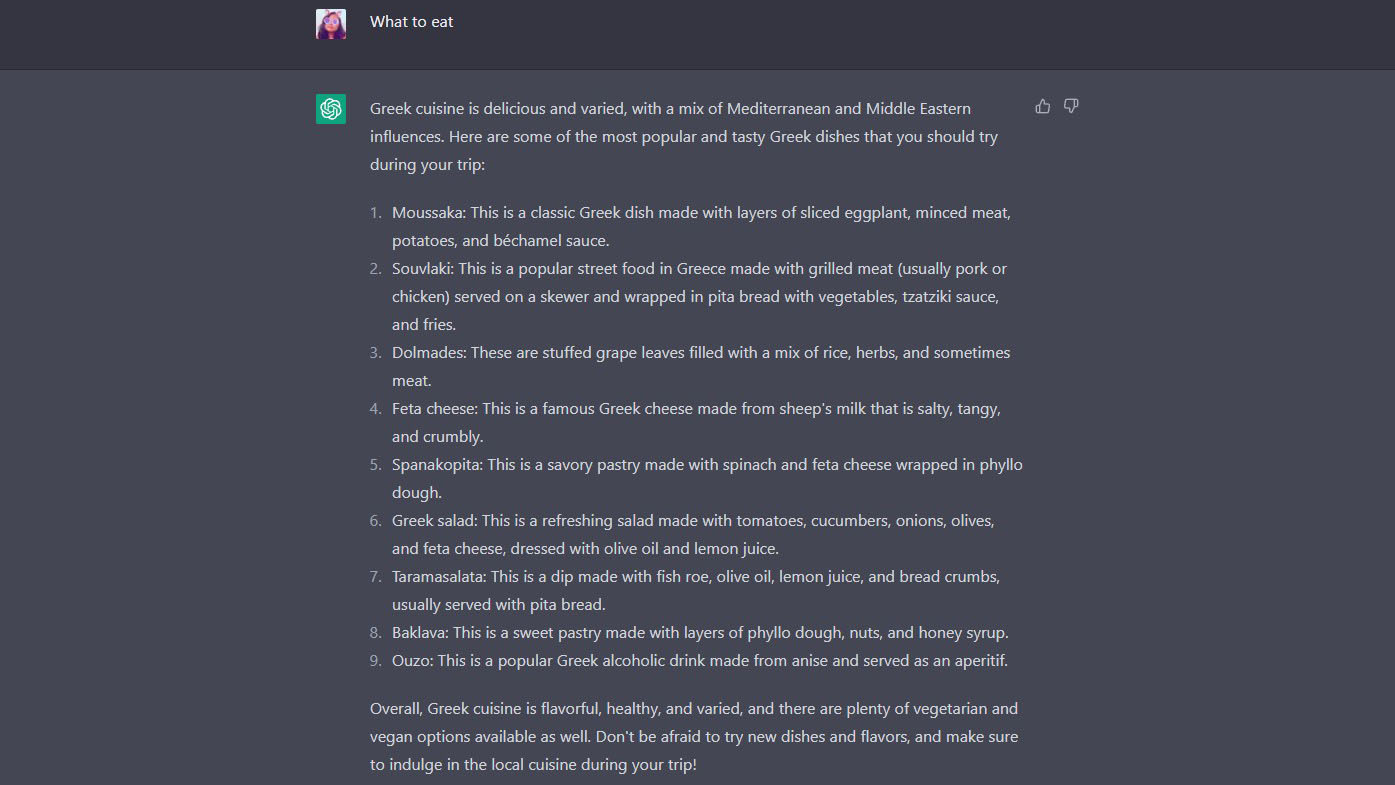
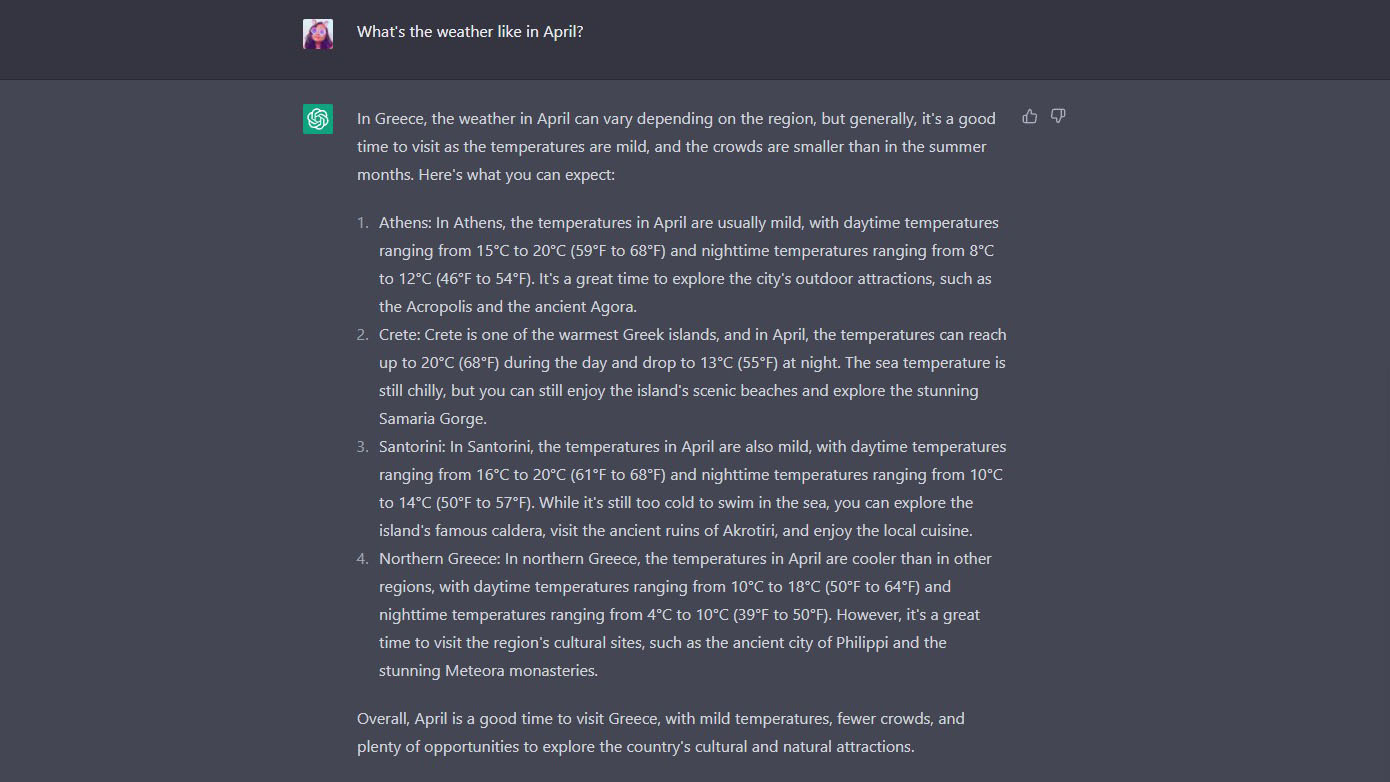
It definitely breaks down every question for you, as if you’re asking a local who’s only too happy to take you around their home country and genuinely wants you to have the best time.
When I asked about safety, it didn't just offer a simple answer; it gave me actual tips on how to stay safe. When I asked about tourist scams, it outlined all the common ones in detail. When I asked about what I should be noshing on, it described every single dish it recommended. When I asked what my budget should be, it gave me a breakdown on accommodation, food, transportation, and attractions, offering estimates for every budget range. If that’s not service, I don’t know what is.
And because it offered up a lot of specific details and useful information – and in such a short amount of time, I might add – I honesty feel more confident about going on my trip. At the very least, I won't end up stranded in a bus station in the middle of the night, suffering from hypothermia. ευχαριστώ, ChatGPT! (That's 'thanks' in Greek.)
Bing AI's citation game is strong
Bing AI isn’t without its merits, though. One of the things it does really well is citations. It does an amazing job of sharing its sources and linking out to them, which is beneficial to both content creators and users of the chatbot.
By name-dropping and linking out to its sources, Microsoft is ensuring that it's giving credit where credit is due, as well as helping to drive traffic to the people and websites that actually do the work to generate content. On the other side of that, readers who want to do their own research – including travelers who want to take a more hands-on approach to their trip-planning – will find it easier to do so. It's a win-win.

The downside to its heavy citation, however, is that its answers feel lazy. When I asked for trip-planning help, it felt like Bing AI wasn’t so much 'thinking' as summarizing each source and listing those out as its answers. It felt very much like I was talking to one of those chatbots on an online store because the business can't afford to hire actual people to handle customer service, which took away that initial confidence I had that it might actually, in some way, help me.
The thing about ChatGPT is that it doesn’t cite its sources at all, which not only makes it harder for you to fact-check the information it’s sharing, but also slows things down considerably if you want to do your own research. It’s no longer a matter of hovering over a source link and clicking; you need to open another tab and do a separate search on Google or Bing, or whatever search engine you’re using.
And if that’s not something you have the time for, you’ll just have to cross your fingers and pray to the (Greek) gods that what ChatGPT is telling you is true – though bear in mind that studies show that chatbots cannot, in fact, be trusted.
As for my vacation, I’m taking everything that ChatGPT has given me with a grain of salt. Luckily, I happen to know someone who's from Greece, and she’s helping me do some last-minute planning – sometimes you just can't beat that human touch.

Michelle Rae Uy is the former Computing Reviews and Buying Guides Editor at TechRadar. She's a Los Angeles-based tech, travel and lifestyle writer covering a wide range of topics, from computing to the latest in green commutes to the best hiking trails. She's an ambivert who enjoys communing with nature and traveling for months at a time just as much as watching movies and playing sim games at home. That also means that she has a lot more avenues to explore in terms of understanding how tech can improve the different aspects of our lives.